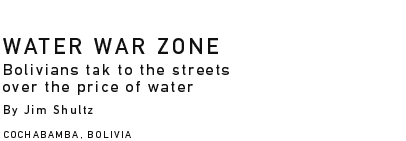
|
| |
|
|
|
A grassroots rebellion over the rules of economic globalization erupted in January in this city of half a million high in the Andes. This time the battle was over something very simple, the price of water. Last year, under direct pressure from the World Bank, the Bolivian government sold off Cochabamba's public water system to a consortium of British-led investors. In January, the new owners, Aguas Del Tunari, handed local water users their monthly bills, emblazoned with a spanking new corporate logo and hikes in water rates that were more than double for many families. In a country where the minimum wage is less than $100 per month, many users were hit with water bills of $20 and higher. In mid-January, Cochabamba residents shut down their city for four straight days with a general strike led by a new alliance of labor, human rights and community leaders. All transportation came to a halt, roads were blockaded, no buses were allowed in or out of town, and the government was forced to the negotiating table, agreeing to a price rollback and a two-week deadline to work out the details. However, it soon became clear that the government's promises were vanishing into thin air. Movement leaders announced plans for a massive but peaceful march to the city's Central Plaza on February 4. Bolivian President Hugo Banzer, who ruled the country as a dictator from 1971 to 1978, responded by bringing in more than 1,000 police and soldiers from outside the city and imposing a military takeover of Cochabamba's center. For two days, while popular leaders and government officials held tense negotiations, police showered tear gas and rubber bullets on rock-wielding protesters, men and women, young and old, poor and middle-class. More than 35 protesters were injured and one youth was blinded. (U.S. Embassy officials acknowledge that the United States has given gas to the Bolivian government before. Embassy officials responded that "to the best of our knowledge" no U.S.-donated gas was used against the water protesters.) The privatization of water is just the latest in a decade-long series of sales of Bolivian public enterprises to international private investors--including the national airline, train system and electric utility--as government officials carefully toe the neoliberal line that "private is better." While the promises have been about an infusion of new investment, the more obvious results have been weakened labor standards, price increases and reductions in services (train service is gone altogether). Privatizing Cochabamba's water was a major item in the World Bank's June 1999 report on Bolivia, which specifically called for"no public subsidies" to hold down water price hikes. Poor countries like Bolivia reject World Bank advice at the peril of being cutoff from international assistance. In a process with just one bidder, local press reports calculated that investors put up less than $20,000 of up-front capital for a water system worth millions. It is worth noting that well-paid World Bank economists in Washington will now pay less for water per month than Tanya Paredes, a mother of five who supports her family as a clothes knitter. Her water bill went up in January from $5 per month to nearly $20, an increase equal to what it costs her to feed her family for a week and a half. "What we pay for water comes out of what we have to pay for food, clothes and the other things we need to buy for our children," she explains. Price hikes like these led to widespread support for the protests. "Everyone took a role," says Oscar Olivera, the Cochabamba labor leader who has become the protests' most visible spokesman. "Youth were on the front lines, the elderly made roadblocks." When protest leaders called on the radio for a citywide transportation stoppage in response to the police crackdown, little old women with bent spines were out in the streets within minutes, building blockades with branches and rocks. The February uprisings forced government officials to promise a
rollback of the rate hike and a review of the water company contract,
a pact that movement leaders want annulled entirely. "We're questioning
that others, the World Bank, international business, should be deciding
these basic issues for us," Olivera says. "For us, that is democracy."
Jim Shultz, executive director of The Democracy Center (www.democracyctr.org), lives in Cochabamba.
|

